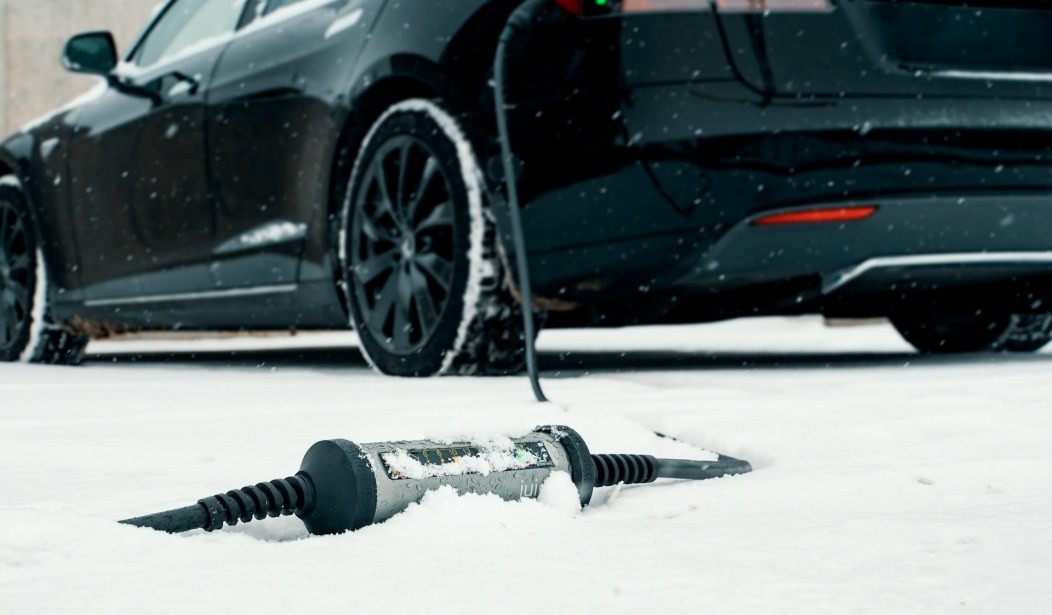If you watched any NFL football action over the weekend, you know that much of the country is in a cold spell. A Bills game in Buffalo, NY, had to be postponed because of a huge storm, while in Kansas City, the Chiefs took on the Dolphins in the coldest game in Arrowhead Stadium history.
But if you live in the Chicago area and drive an electric vehicle, you might have had a tough go of it because Tesla battery chargers reportedly froze and left motorists unable to power up. The deep freeze turned public charging stations into “car graveyards,” according to a Chi-town Fox affiliate.
"Nothing. No juice. Still on zero percent," said Tyler Beard, who has been trying to recharge his Tesla at an Oak Brook Tesla supercharging station since Sunday afternoon. "And this is like three hours being out here after being out here three hours yesterday."
Beard was among the dozens of Tesla owners trying desperately to power up their cars at the Tesla supercharging station in Oak Brook. It was a scene mirrored with long lines and abandoned cars at scores of other charging stations around the Chicago area.
"This is crazy. It’s a disaster. Seriously," said Tesla owner Chalis Mizelle.
This social media poster said he experienced problems in Auburn Hills, and I’m assuming he means in Michigan:
Not the best design for superchargers. Half of the plugs at the auburn hills @Tesla @TeslaCharging charger are frozen in various ways. pic.twitter.com/SpRXr7lVPo
— Karl (@KarlMozurkewich) January 13, 2024
This guy faced a similar problem in November:
So my @Tesla is captive by a frozen charger. If I leave I lose my cable 🥶🥶🥶 I guess these chargers are not made for cold weather 👀👀👀 gonna be an interresting dutch winter 🤣 Called this morning the company but so far no mechanic (was promised within 2 hours) pic.twitter.com/yen2EkYZEk
— Daniel(a) (@_ChezDaniela) November 20, 2022
One annoyed driver said, "We got a bunch of dead robots out here." But while frozen Tesla chargers might induce snickers from some people, one stranded passenger was not amused:
But it was no laughing matter to people like Kevin Sumrak, who landed at O’Hare on Sunday night to find his Tesla dead.
Sumlak was forced to hire a flatbed tow truck to try to find a working charging station.
Frozen chargers aren't the only issue that EVs face in cold weather -- the batteries also need more time to charge:
If your EV’s battery is too cold, it may take a lot more energy in order to start. Lithium-ion batteries within the car themselves are sensitive to temperatures, preferring a range of 60 to 80°F. If possible, keep your car in a garage so that it is less susceptible to becoming overly cold.
Your best defense in cold weather is not letting your EV get below a 20% charge. That 20% charge acts as reserve in case the battery is too cold and needs to pull from that stored energy to begin the charging process.
#Chicago #Tesla #charging due to absolute nasty #artic #weather.
— beyerch (@beyerch) January 15, 2024
In my #ModelS - 3 mile in town drive was 911 Wh/mi. / 11 miles ate up 8Kwh of battery. #ModelX - 8 miles for 6 kWh / 751 Wh/mi#brrrrrrr #TSLA $TSLA #TSLAQ $TSLAQ pic.twitter.com/oLkAvoKniy
Luckily, automakers have invented a reliable solution that increases the range of automobiles, operates in cold weather, and doesn't need constant charging. They've named it the "gas-powered vehicle."















Join the conversation as a VIP Member